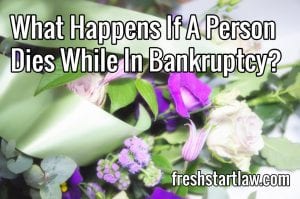What Happens If A Person Dies While In Bankruptcy?

Deceased Debtor & Chapter 7 Bankruptcy
In Chapter 7 bankruptcy, debts are paid off from the sale of non-exempt debtor assets. This process is administered by a bankruptcy trustee. If the debtor dies, the bankruptcy sale can continue since the trustee already has control of the assets. As long as the creditors have no objections during this process, the bankruptcy typically proceeds to full discharge. In this case, the debtor’s heirs are not involved or responsible for any unpaid debt.
Deceased Debtor & Chapter 13 Bankruptcy
In chapter 13 bankruptcy, outstanding debts are paid off according to a payment plan that lasts 3 – 5 years. In some cases, this allows the debtor to retain his/her property. Since this is an ongoing process, the debtor’s death can make things more complicated for heirs. When the debtor passes away, the court might decide to dismiss the case. Otherwise, the heirs may choose to continue to make payments until discharge. Why would they do this? In many instances, it depends on the property of the deceased.
Home Debt
If the deceased debtor had a mortgage, the lender will make an effort to transfer the mortgage to the heirs. If they decide to keep the property, the heirs must keep paying the chapter 13 payments to keep the house out of foreclosure. Another option would be to pay off the mortgage lender through refinancing.
Other Secured & Unsecured Debts
If the deceased had other secured debts such as a car, boat, jewelry, furniture, or valuable artwork, the heirs may decide to buy or refinance this debt. Others choose to continue with the bankruptcy which means they might pay less on the debts than their true market value. Debt from credit cards or medical bills is considered unsecured debt. Heirs are not considered liable for this type of debt, however, creditors could seek payment from the deceased’s estate. If the estate is small, then dismissal is likely. For larger estates the heirs might choose to continue paying the bankruptcy payments. This may allow them to dismiss the debt at a discount and keep a larger portion of the estate inheritance.
Deceased Spouse In Chapter 13
If a couple files for chapter 13 jointly, and one of them dies prior to discharge, the survivor may appeal to the court for lower payments. Sometimes the bankruptcy can be separated so that the surviving spouse only pays off debts where he/she is directly involved. Bankruptcy courts may also grant a hardship discharge if the surviving spouse can’t make payments. This may be due to a significantly reduced income after their spouse’s death. Contact Sirody & Associates for a free consultation with an experienced Baltimore bankruptcy attorney.
